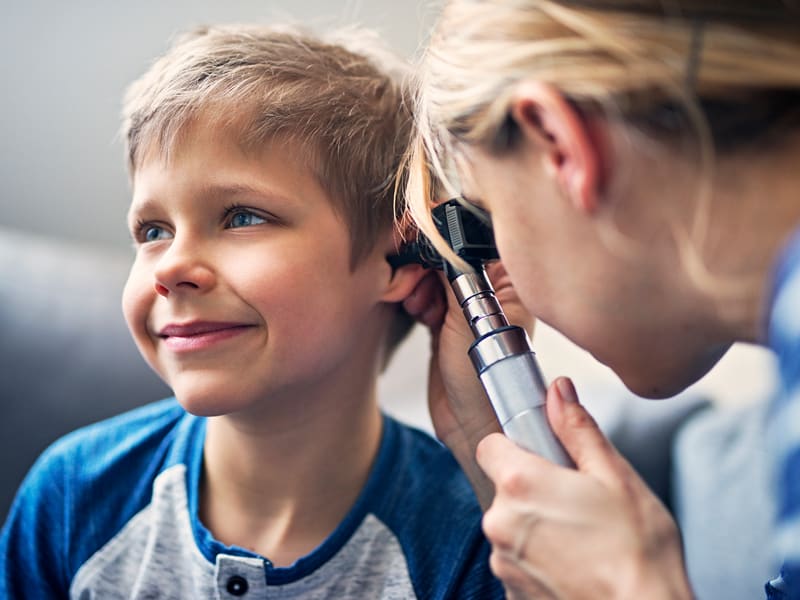More Topics
◀ Home
How child ear infections delay development
 Ear infections are one of the most common health problems in children. Most ear infections in children are caused by bacteria that gets trapped in the middle ear. Children can often get ear infections after they’ve had a cold, flu or other sickness.
Ear infections are one of the most common health problems in children. Most ear infections in children are caused by bacteria that gets trapped in the middle ear. Children can often get ear infections after they’ve had a cold, flu or other sickness.
An ear infection can usually get better and heal on its own without going to see a provider. But chronic ear infections can affect a child’s long-term hearing or even their development.
Because of how often children have ear infections, it can be hard to know whether a child needs rest and over-the-counter medicine, or if it’s time to visit a provider like an ear, nose and throat (ENT) specialist.
Signs of an ear infection
Nearly 90% of children will have had an earache by their third birthday. Children don’t have strong immune systems yet and their eustachian tubes (the opening that connects the middle ear to the sinus nasal cavity) are small and horizontally shaped. That means it’s harder for fluid to drain out of their ears, which can cause an infection.
Children may often get an earache a week or two after a cold. Here are some of the signs that your child might have an ear infection:
- Crying more than normal
- Tugging at an ear
- Balancing problems
- Trouble sleeping
- Muffled hearing
- Feeling pressure or fullness in the ear
- Itching, pain or irritation in the ear
- Discharge or fluid coming from the ear
- Recent fever of 100 degrees or higher
If the early symptoms of an ear infection are severe or the ear infection doesn’t get better or the symptoms get worse after 24-48 hours, then it may be time to see a provider.
Chronic ear infections and developmental delays
If it’s normal for a child to have an ear infection, then when is an ear infection a more serious health issue?
Chronic ear infections are defined by the American Academy of Otolaryngology-Head and Neck Surgery as three ear infections in six months or four ear infections in 12 months.
Chronic ear infections can lead to developmental delays in children. Listening to a parent or teacher when your ears have fluid behind the eardrum is like trying to listen to a conversation when you’re underwater. Trouble hearing can make it more likely that a child will not say words correctly. In turn, this can affect their ability to listen to directions from a teacher or read correctly.
Over time, the muted and distorted sounds can lead to speech delays, smaller vocabularies, trouble hearing directions, or even difficulty reading. If your child starts to listen to the TV at a louder volume or asks people to repeat things, then it might be a sign that their hearing has changed.
Specialists can begin treating patients as early as newborns to help with feeding and speech delays. The sooner that speech or hearing problems are found, the sooner a child can get the help they need.
Prevent regular ear infections
Lower your child’s chances of frequent earaches by following these steps:
- Make sure your child gets a yearly flu shot
- Keep your child away from cigarette smoke
- Stop germs from spreading by washing hands often
- Don’t put your child to sleep by laying them down with a bottle
Find a provider
While you can do your best to prevent or reduce the number of ear infections your child has, they may still have them. Make sure your child has a primary care provider (PCP) who can help when an ear infection is more than a childhood illness.
Blue Cross of Idaho members can find a PCP for their child by logging in to the member account on our member wesbite and selecting Find Care. From there, you can search for providers by specialty, location and more.
Written by: Cloei Durrant, a Quality Outreach Specialist at Blue Cross of Idaho and a registered respiratory therapist. Cloei has a master’s degree in healthcare administration with more than a decade of experience in healthcare. She focuses on helping improve the overall quality of care for members.
Posted: March 6, 2024
